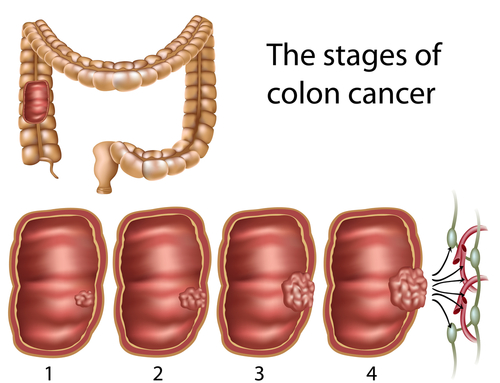Colon Cancer
Definition of Colon Cancer
Colon cancer is also termed as colorectal cancer. It denotes to the malignant growth in the inner wall of large intestine and the rectum. Researches have shown that both colon and rectal cancers are the same in origin. In the beginning there are small, non cancerous growths inside the colon that are known as adenomatous polyps. Later these polyps are converted into colorectal cancers. Treatment plan depends upon how far the cancer has spread, which is known as staging of cancer.
 There are four stages of colon cancer that are as follows:
There are four stages of colon cancer that are as follows:
Stage 1 : Cancer has penetrated into the lining of the colon or rectum, but does not go beyond their organ walls
Stage 2 : Cancer spreads to the walls of colon or rectum but lymph nodes are not involved at this stage
Stage 3 : Cancer has involved the lymph nodes as well
Stage 4 : Cancer is spread to other organs of the body at this stage
Cause of Colon Cancer
There is no certain cause yet found of the colon cancer. However, following are considered causes:
Inflammatory bowel disease : Ulcerative colitis and Crohn’s disease, both are responsible for causing the colon cancer.
Precancerous growths : Small growths known as polyps in the lining of colon are converted into the colon cancers in many people.
Genetic mutations : Those mutations in genes which cause colon cancers are hereditary and can be passed from parent to child.
Signs and Symptoms of Colon Cancer
Symptoms are usually non specific at early stages. But if they persist, they are the symptoms of colon cancer:
- Changes in bowel movements such as diarrhea or constipation
- Change in stool colour
- Discomfort in abdomen or abdominal cramps
- Blood in stool
- Bleeding from the rectum
- Feeling that bowel does not evacuate completely
- Weakness
- Fatigue
- Unexplained weight loss
Risk Factors for Colon Cancer
The risk factors which increase the chance of developing colon cancer are following:
- Older age
- Prior history of polyps
- African American race
- Inflammatory bowel disease
- Family history of colon cancer and colon polyps
- Obesity
- Alcohol
- Diabetes type 2
- Low fiber, high fat diet
- Smoking
- Sedentary lifestyle
- Radiation therapy for cancer
Diagnosis of Colon Cancer
The diagnosis which is indicative of colon cancer comprises of following procedures:
Blood tests : Routine blood tests are done to check out for blood count and ESR to rule out any other cause.
Colonoscopy : A long tube is inserted into the colon at the end of which a camera is attached. It helps the doctor to visualize the inside for any abnormal growth. It also helps to remove some tissue and sent for sampling.
Barium X Ray : A radioactive element barium is inserted into the colon by the help of enema, which makes the lining of colon visible on X Ray scan.
CT scans : These are also known as virtual colonoscopies. Computed tomography scans give the detail of abnormal growths and help planning the way of treatment.
Staging : Sample of the colon tissue and lymph nodes is removed and is checked under microscope to stage the cancer. It shows that how far the cancer has spread.
Prevention from Colon Cancer
A normal person should start getting Cancer Screening after age of 50 as chances are very much increased after this age. Following measures should be taken to avoid developing Colon Cancer.
Eat healthy food including fruits, vegetables and whole grains. It help in keeping digestive system healthy and also plays a role in avoiding cancer.
Stop smoking and alcohol intake at age above 45 because it not just increases Colon Cancer incidence but also several other diseases.
Exercise in moderate amounts helps a lot in preventing Colon Cancer and several other diseases. A person should exercise at least 30 minutes daily.
Obesity and being underweight is a major risk factor towards developing Cancer. A person should maintain a healthy diet along with exercise to maintain a normal body weight.
Treatment of Colon Cancer
Treatment plan depends upon the stage of the cancer and overall health of the patient. Following methods are used to treat the colon cancers:
Surgery : At early stages, surgery is helpful to remove the polyps and the initial cancerous growth on colon. If there is invasive colon cancer, then a part of the colon is removed through surgery and it is known as Partial Colectomy. If a big part of colon is removed then it is open to outside thro
Chemotherapy : Chemotherapy drugs kill the Cancer cells. It can be used before surgery to reduce tumor size. Or it can be used after surgery for cancer which has advanced to other lymph nodes. It is mostly used with Radiotherapy. It is also used to stop recurrence and relieve symptoms of Colon Cancer.
Radiotherapy : High power radiations such as X-rays and Radioactive waves are used to kill cancer cells. It can be used after surgery for persistent cancer cells or before surgery to shrink tumor size and make surgery easy.
Medications : Targeted medicines are available which treat specific defects in Colon Cancer patients. This helps in spread and growth of Cancer and relieves symptoms. However due to higher cost and many side effects these drugs are only reserved for advanced Colon Cancer.
